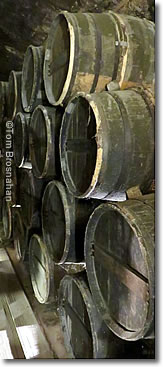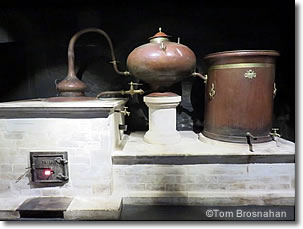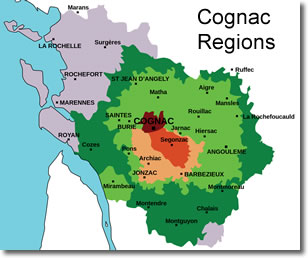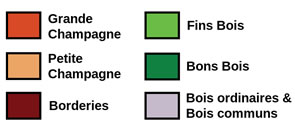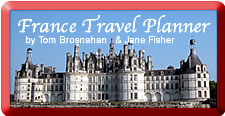 |
How Cognac is Made in Cognac, France | |
| The grapes must come from particular areas, the oak of the barrels is special... Everything in the art of cognac production is carefully done. | ||
|
|
|
Cognac RegionCognac is the brandy made from grapes grown in six strictly-regulated crus or areas of the Cognac region, differentiated by quality and characteristics: Grande Champagne, a small area south of Cognac of limestone and chalk soil Petite Champagne, a larger area south of Cognac with similar soils Borderies, a small area northwest of Cognac with clay and flint in the soil Fins Bois, the wider area surrounding Cognac, including Angoulême and halfway to Rochefort, with abundant red clay Bons Bois, wider still, to Royan, sandier soil in a more moderate coastal climate Bois Ordinaires, the Atlantic region northwest of Cognac, Royan to Rochefort and La Rochelle, with sandy soils and a coastal climate Cognac GrapesThe white grapes used to make cognac are Ugni blanc (also called Saint-Émilion or Trebbiano), the most abundant, followed by Folle Blanche, Colombard, and lesser-used white grapes which all make a thin, very dry and acidic wine—not good to drink—but which lend themselves to the making of fine brandy. DistillationAfter being picked in the autumn, the grapes are pressed and left to ferment for two to three weeks, producing a wine of about 7% or 8% alcohol, which is then double-distilled in copper pot stills to produce a clear liquid spirit of about 70% alcohol. Aged in OakIn mid-winter, spirits from the various fermentations are selected and blended to achieve consistency and desired characteristics, and placed in barrels of French oak from Limousin or Tronçais to be aged. The barrels are kept in cellars or caves with a constant temperature around 15°C (59°F) for a minimum of two years. In a low-humidity cellar the barrels will lose some of the volume of the spirit, and this concentrates the alcohol. In a humid cellar, volume loss is less, but the alcohol percentage is lower. At the end of ageing, the alcohol content may have slipped from 70% to as low as 40%. BlendingAfter ageing, the spirit is transferred to large glass containers, and spirits from various batches and years are blended to achieve the desired final product. The color, scents, flavors and characteristics of the finished cognac are the product of the grapes, the blend, the way they are aged and the length of time they are aged. Quality Grades of CognacTo be called Fine Champagne Cognac, a spirit must be made from at least 50% Grande Champagne grapes, with the remainder coming from Petite Champagne. (This use of the word champagne has no relation to the northern French region of Champagne famous for its sparkling wines.) These quality terms are based on English terms because British entrepreneurs were instrumental in developing the cognac trade, and British customers were the most enthusiastic purchasers and drinkers of cognac. V.S. (Very Special, 3-star): the youngest spirit in the blend has been aged for at least two years in the barrel V.S.O.P. (Very Superior Old Pale, 4-star): the youngest spirit in the blend has been in the barrel for at least four years X.O. (Extra Old): the youngest spirit in the blend has been aged for at least ten years in the barrel (before 2016 it was six years) Older Cognacs: some cognac distillers produce even older, rarer cognacs to which they give their own rtful marketing designations. Remember that a claim of "30 years" may refer to the oldest spirit in the blend, not the youngest. It does not mean that all spirits in the blend are that old. Visit a Cognac DistilleryWith nearly 200 distilleries in the region producing cognac, it's easy to visit one and taste the products. More...
|
|
Historic alembic distillery in the Château de Cognac, Cognac Otard, Cognac, France.
|
